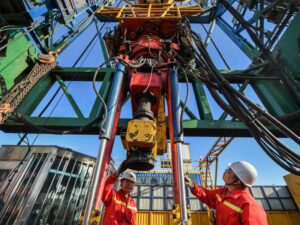
Menu
OrientMCT
Advanced Drilling Technology
Advanced Drilling Technology refers to the application of cutting-edge techniques, equipment, and methodologies in the field of drilling to enhance efficiency, safety, and well productivity. It involves the integration of advanced technologies and innovations to overcome drilling challenges and optimize drilling operations in the oil and gas industry. Here are some key aspects of Advanced Drilling Technology:
Automation and Robotics: Advanced drilling technology incorporates automation and robotics to improve drilling processes. Automated drilling systems, robotic drilling rigs, and autonomous drilling operations help increase drilling efficiency, reduce human error, and enhance safety by minimizing personnel exposure to hazardous conditions.
Data Analytics and Digitalization: Advanced drilling technology utilizes data analytics and digitalization to optimize drilling operations. Real-time data acquisition, analysis, and visualization enable quick decision-making, wellbore monitoring, and performance evaluation. Predictive analytics and machine learning algorithms help identify drilling trends, anomalies, and potential issues, enabling proactive decision-making.
Directional Drilling and Geo-steering: Advanced directional drilling techniques enable precise well placement and reservoir targeting. Geo-steering technologies, such as real-time measurements while drilling (MWD) and logging while drilling (LWD), provide accurate formation evaluation, helping drillers navigate the wellbore through complex geological formations.
Managed Pressure Drilling (MPD): MPD techniques allow for precise control of wellbore pressure throughout the drilling process, especially in challenging drilling environments. MPD helps mitigate drilling hazards, control influxes or losses, and optimize drilling performance by maintaining wellbore pressure within desired limits.
Underbalanced Drilling (UBD): Underbalanced drilling technology involves drilling with wellbore pressure maintained below the formation pressure. UBD techniques minimize formation damage, reduce drilling fluid losses, and enhance drilling efficiency in reservoirs prone to drilling complications.
Extended Reach Drilling (ERD): ERD techniques enable drilling long horizontal or highly deviated wells, extending the reach from a single wellbore. ERD technology maximizes reservoir contact and improves well productivity by accessing larger portions of the reservoir and reducing the number of wells required.
Real-Time Drilling Monitoring and Surveillance: Advanced drilling technology includes the use of real-time monitoring and surveillance systems to enhance drilling operations. Downhole sensors, intelligent drilling systems, and advanced surveillance technologies provide real-time data on drilling parameters, wellbore conditions, and equipment performance, enabling proactive decision-making and timely interventions.
Drilling Fluid Innovations: Advanced drilling technology incorporates innovative drilling fluid systems and additives to improve drilling performance and wellbore stability. This includes the development of environmentally friendly fluids, nano-sized additives, and advanced rheology modifiers that enhance drilling efficiency, hole cleaning, and formation protection.
Wellbore Integrity and Casing Design: Advanced drilling technology focuses on wellbore integrity and casing design to ensure long-term well performance. Advanced casing materials, cementing techniques, and integrity management systems help prevent fluid migration, casing failure, and wellbore instability, ensuring safe and sustainable drilling operations.
Health, Safety, and Environmental Considerations: Advanced drilling technology emphasizes health, safety, and environmental practices. Rig automation, advanced well control systems, and real-time monitoring contribute to safer operations. Additionally, environmental considerations focus on minimizing environmental impact through proper waste management, reduced emissions, and the use of eco-friendly technologies.
Throughout the course, participants will learn about various drilling methods and techniques used in the industry, including rotary drilling, directional drilling, and offshore drilling. They will explore the functions and components of drilling rigs, such as drill bits, drill pipes, and drilling mud systems, and understand their roles in the drilling process.
The course will cover essential concepts related to well planning and design, including wellbore stability, casing and cementing operations, and well control techniques. Participants will gain insights into the importance of geology in drilling operations, as they learn about formation evaluation, pore pressure analysis, and wellbore hydraulics.
Advanced Drilling Technology courses and training programs provide professionals with in-depth knowledge and practical skills in utilizing advanced drilling techniques and technologies. These courses often combine theoretical instruction, hands-on exercises, case studies, and field simulations to equip participants with the expertise needed to optimize drilling operations, enhance well productivity, and ensure safe and efficient drilling practices.

Get In Touch!
Contact us for a quote or in case of any urgent queries please send us an email on: info@orientmct.com
we will get back to you right away!